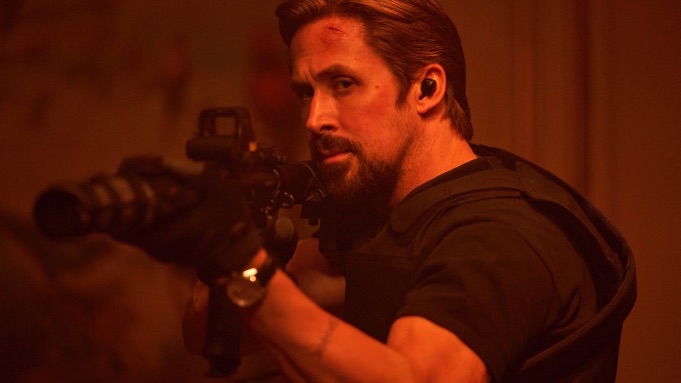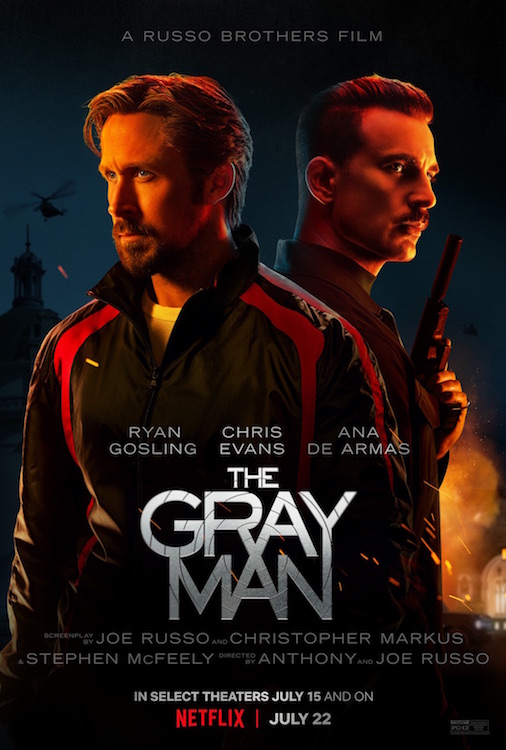A hyper-caffeinated blend of the the Jason Bourne and John Wick films told through the colorful, bloodless filter of the Marvel Cinematic Universe (MCU), The Gray Man feels too big to be relegated to Netflix. It’s a globe-trotting actioner with multiple effects-heavy set pieces that feel designed for the biggest screen possible, and a cast that must have set the streamer back a pretty penny.
But a passing glance at the clichéd script, coupled with a pace designed to keep people from clicking to the next option, reveals this as another algorithm-influenced streaming distraction. While The Gray Man’s cast makes the film an improvement on Netflix time-wasters like Red Notice or 6 Underground, it can’t help but feel disposable, the type of noisy, empty bit of pabulum that previously would have been relegated quickly to repeat showings on TNT.
The first directorial effort from Joe and Anthony Russo since Avengers: Endgame, the film is adapted from Mark Greaney’s first Courtland Gentry novel. Ryan Gosling is Gentry, a CIA assassin recruited by Fitzroy (Billy Bob Thornton) out of prison. Fitzroy believes Gentry got a bad wrap but that his killer instincts might make him a major asset to U.S. espionage work. He’s right, at least until a decade later, when a mission goes awry and Gentry stumbles upon proof of CIA malfeasance.
Hoping to cover their tracks, the CIA enlists psychopathic mercenary Lloyd Hansen (Chris Evans). Hansen isn’t bound by the CIA’s rule, and has no qualms about torture or dispatching a team of elite assassins to hunt Gentry down. Gentry’s only friend is his former partner, Dani (Ana de Armas), who quickly pieces together that she’s on the wrong side. From there, it’s a race around the world with over-the-top melees involving planes, trains, automobiles, fists, and lots and lots of guns.
Hot off one of the biggest and most successful movies of all time, the Russos don’t seem interested in directing chamber pieces. While Greaney’s novel is chock-full of chases and fights, it still takes place in a recognizably grounded, real world. From the start, the Russos are playing in a field that’s much more heightened; the film’s opening action sequence, set in a ballroom atop a floating restaurant in Bangkok, is a fun and colorful bit of chaos that climaxes in a brawl alongside exploding fireworks. The use of drones in the middle of chase footage lends the sequences a brisk energy, and Netflix spared no expense allowing the brothers to destroy whole city blocks.
The film barely lets up, moving quickly into a shootout inside (and outside) of a crashing plane, a rumble on a runaway streetcar, and numerous fist, gun and knife fights. Perhaps learning from their work in the MCU (remember, the brothers also directed Captain America: The Winter Soldier, one of the few Marvel movies to have coherent and effective action sequences), the Russos know their way around a close-quarters fight, and these are the moments that are most effective. The effects-heavy set pieces are a bit more mixed; the streetcar fight is a lot of fun, but there’s a midair brawl that is just a collection of indecipherable blurs.
The Russos started in comedy, most notably directing classic episodes of Community. They bring a welcome tongue-in-cheek tone to The Gray Man, which never succumbs to the brooding of the Bourne franchise or the self-seriousness of the John Wick movies. The film is punctuated with humorous grace notes that keep the story moving and never let it get too heavy; this is supposed to be a good time. Which is a fine approach, except when it brushes up against awkwardly against Gentry’s backstory, which includes an abusive father and a teenage murder.

Ryan Gosling in “The Gray Man.” © 2022 Netflix, Inc.
The script, by Joe Russo, Christopher Markus and Stephen McFeely (both of whom worked with the brothers on their Marvel projects) isn’t too interest in that bit of exposition, peppering in flashbacks fleetingly to give just enough exposition before moving on to the next set piece. The plot unfolds at such a manic pace that plot developments never land and connections between the CIA, the villains and others never make much sense. The directors and editors never give the audience time to breathe, making a 122-minute movie feel both exhausting and too short. It’s all sizzle, no steak, with the surface elements of a good film but no real core for the audience to attach emotions to.
The cast takes this material and makes it watchable. Gosling, who hasn’t appeared in a movie since 2018’s First Man, is a solid action hero, bringing an exasperation and levity that puncture the stoic vibe others might bring to the work. At times, there are hints of his Nice Guys humor and charm, which make Gentry a nice change of pace from the brooding loner these films usually focus on. Thornton is always a welcome addition to any film, even in small doses, and de Armas has solid chemistry with Gosling. Her small role in No Time to Die already proved she could navigate an action scene, and she’s given more chances to strut her stuff here.
But the film’s biggest pleasures come from Chris Evans who, between this and Knives Out, seems to be relishing the opportunity to play the anti-Captain America. Lloyd is a cavalier douchebag, and Evans telegraphs his smarminess with the awful haircut and mustache he sports. It would be tempting to make this film’s bad guy a big, intimidating presence. Instead, Evans plays him like a petulant, privileged rich white boy, and it’s a lot of fun watching him be so unlikable. It’s just a shame he probably won’t be around for the eventual sequel.
There are currently 11 novels in Greaney’s Gray Man series, and The Gray Man’s biggest flaw is that it feels too intent on getting one story done in just over two hours instead of slowing down and making this a longer series. Some time to breathe could have made this a more substantial and engaging movie, instead of a colorful distraction to have on while folding laundry. This cast is having a great time; it’s a pity the movie doesn’t seem to want to stay with them a bit longer.

| Producer: | Joe Roth, Jeff Kirschenbaum, Joe Russo, Anthony Russo, Mike Larocca, Chris Castaldi |
| Release Date: | July 15, 2022 (theatrically); July 22, 2022 (Netflix) |
| Running Time: | 122 minutes |
| Starring: | Ryan Gosling, Chris Evans, Ana de Armas, Regé-Jean Page, Billy Bob Thornton, Wagner Moura, Alfre Woodard, Julia Butters |
| User Rating: | |
| Writer: | Joe Russo, Christopher Markus, Stephen McFeely |
| MPAA Rating: | PG-13 (for intense sequences of strong violence and language) |
| Director: | Anthony Russo, Joe Russo |
| Distributor: | Netflix |
| External Info: | Official Site |

